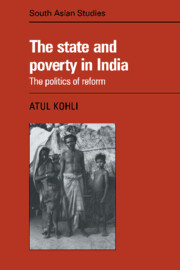Book contents
- Frontmatter
- Contents
- List of Tables and Figures
- Acknowledgements
- Introduction
- 1 The State and Redistributive Reforms
- 2 Democracy and Development in India: an Interpretation
- 3 West Bengal: Parliamentary Communism and Reform from above
- 4 Karnataka: Populism, Patronage, and Piecemeal Reform
- 5 Uttar Pradesh: Political Fragmentation, Middle-Peasant Dominance, and the Neglect of Reforms
- 6 Conclusion: The State and Reform in Democratic–Capitalist Development
- Appendix I On the Political Relevance of Social Classes in a Developmental Setting
- Appendix II Does Agriculture Growth Really “Trickle-down” in India?
- Bibliography
- Index
- CAMBRIDGE SOUTH ASIAN STUDIES
4 - Karnataka: Populism, Patronage, and Piecemeal Reform
Published online by Cambridge University Press: 27 October 2009
- Frontmatter
- Contents
- List of Tables and Figures
- Acknowledgements
- Introduction
- 1 The State and Redistributive Reforms
- 2 Democracy and Development in India: an Interpretation
- 3 West Bengal: Parliamentary Communism and Reform from above
- 4 Karnataka: Populism, Patronage, and Piecemeal Reform
- 5 Uttar Pradesh: Political Fragmentation, Middle-Peasant Dominance, and the Neglect of Reforms
- 6 Conclusion: The State and Reform in Democratic–Capitalist Development
- Appendix I On the Political Relevance of Social Classes in a Developmental Setting
- Appendix II Does Agriculture Growth Really “Trickle-down” in India?
- Bibliography
- Index
- CAMBRIDGE SOUTH ASIAN STUDIES
Summary
Devraj Urs ruled Karnataka for most of the 1970s. He came into power in 1972 and was ousted in 1980. His rise to power, while complex, was largely a byproduct of the earlier split in Congress and the later rout of the old Congress by the Indira-dominated Congress. As the “Indira man” in Karnataka, Urs sought to create a new power base. The old ruling pattern had consisted of the nationalist generation of Congress leaders in alliance with the propertied of the “dominant castes.” With the goal of displacing this ruling alliance, Urs diversified Karnataka's political scene. He consolidated his own position by including propertied groups from castes other than the dominant ones, the hitherto excluded members of the dominant castes, and some members of the backward classes.
The mechanisms of inclusion in and exclusion from the ruling alliance were primarily the distribution of the spoils of political power. Additionally, however, the new ruling alliance, based on patronage like the old one but with a diversified social base, was cast in a populist idiom. Promising “welfare for the masses” and a commitment to the Congress slogan of garibi hatao (“eradicate poverty”), Urs sought to implement some visible redistributive programs. In this chapter I analyze both the nature of the Urs regime and the anti-poverty programs pursued in Karnataka. The general issue concerns the capacity of a patronage-based, populist political arrangement for redistributive reforms.
I will argue that the reformist capacities of the Urs regime were limited. Strong leadership and patronage-based support facilitated the implementation of some redistributive programs.
- Type
- Chapter
- Information
- The State and Poverty in India , pp. 144 - 187Publisher: Cambridge University PressPrint publication year: 1987



